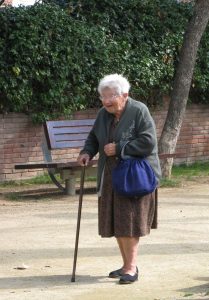No one likes to be alone, but sometimes circumstances force us to cut down on our socialization and forces us to spend too much time alone. Age and age-related health conditions and disabilities play a huge role in preventing seniors from socializing as much as they would like. This is an unhealthy state to be in. Social isolation is harmful to the senior at an emotional, mental and physical level.
Understanding Loneliness
As a senior age, they begin losing family and friends around them. In addition, their own health and mobility issues prevent them from going out and making new friends. Death of a spouse and chronic ailments only compound the feeling of isolation.
It is important to realize that solitude and loneliness are two different things. A senior may cherish solitude, but loneliness is painful. It makes them feel unloved and unwanted. This can lead to depression and an inability to perform everyday activities. Adult children and other family members must keep a close watch on a senior to ensure their social wellness.
Facts About Senior Isolation
Senior isolation is more widespread and frightening than you can imagine. It carries certain risks that you should be aware of.
Some of the facts related to senior isolation include the following:
- It Increases Chances of Mortality: Research has shown that seniors 52 years and above have a higher risk of mortality, especially if they do not have a support network to depend on if they require urgent medical attention.
- Isolation Adversely Affects Mental and Physical Health: Seniors who lead a lonely life are more likely to have poor physical and mental health as well, according to research.
- High Risk of Dementia: Loneliness increases the chances of cognitive decline. It also is a contributing factor of dementia.
- Vulnerable to Elderly Abuse: Isolated adults are more vulnerable to abuse. Also, it has been observed that an abuser may also try to isolate a senior to prevent being discovered.
- Major Cause of Depression: Seniors who are socially isolated have higher incidences of depression compared to those who have a social network to lean on.
- Elevated Blood Pressure: Regardless of the race and gender, seniors who are lonely tend to have higher blood pressure, which can lead to several other health problems.
How to Spot and Reduce Social Isolation?
Since social isolation can have a profound effect on an elderly person’s health and well-being, it is important to identify triggers and eliminate them.
Some of the ways to reduce social isolation include the following:
- Encourage socialization: Make sure you parent can mingle with the local community even if they have a physical disability. You can enroll you parent in the local adult day care center or senior center to ensure they are not living in isolation, away from neighbors and other people of their age.
- Get a pet: If your parent loves animal, it is a good time to get them a pet. Looking after a dog or cat will give them a purpose in life and help to combat loneliness. Or, if the senior does not have mobility issues, you can get to volunteer as a pet walker in a local animal shelter. Caring for a pet can improve mood, boost memory and reduce anxiety and elevated blood pressure.
- Moving Around: How does your parent get to the doctor for an appointment or how do they visit the local grocery store? Do they have the means of transportation? If not, arrange with neighbors or arrange a ride service to take them out with friends, for movies or the theater.
The only way to spot loneliness and isolation early is by ensuring that you are an integral part of your parent’s life. It will also allow you to intervene and find a solution before your parent withdraws completely into isolation, which can be detrimental to their overall health and well-being.

